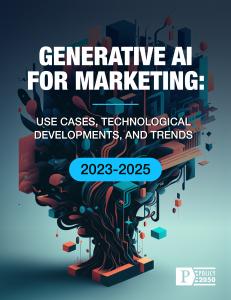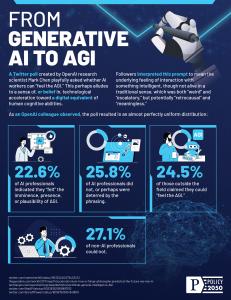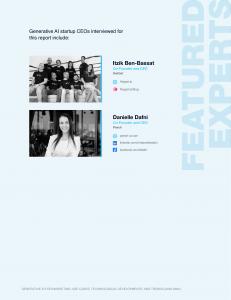New Generative AI Report Offers Insights from Marketers on the Technology’s Potential and Limitations
The 53-page analysis answers important questions about rapid transformations.
SAN FRANCISCO, CALIFORNIA, USA, April 5, 2023/EINPresswire.com/ -- A new Policy2050.com report offers valuable insights into the world of generative AI and its potential applications in marketing. Seven marketing and communications leaders are quoted in the report, alongside two founders of generative AI startups: theGist, a workplace productivity AI tool, and Peech, which offers automatic video editing software.
The report, titled “Generative AI for Marketing: Use Cases, Technological Developments, and Trends (2023-2025),” emerged from these interviews and secondary research conducted by Policy2050, a market research firm focused on tech disruption. The report identifies some of the ways that CMOs and digital marketers are already using generative AI, discloses the shifting perspectives in marketing departments or agencies, and offers predictions for future applications. Marketers also noted areas that still need improvement or may always require a human creative touch.
Policy2050 founder and report author David Pring-Mill introduced the report by noting that “generative AI represented a collective lightbulb moment, illuminating the potential of creators working in concert with technology, at the end of a destructive year.”
5WPR Co-CEO Matthew Caiola told Policy2050 that people-led content and campaigns still have a relatively secure place because there’s an ongoing need for new inputs. He explained, “AI will also always lag behind the human process, waiting for its resources to be updated with industry linguistics and neologisms.”
What if generative AI could also function as an assistive technology? Itzik Ben-Bassat, an innovator whose background includes executive roles at Blizzard Entertainment and Wix, is helping to cut down on information overload as CEO of theGist. He told Policy2050: “In a company, the information is live. And there is a social graph that impacts the information. And for us, the connectivity between the social graph and the knowledge graph is critical.”
Danielle Dafni, another generative AI startup founder, told Policy2050 that she and her team are positioning Peech as a content expert, not just a tool. Dafni explained, “The goal is to help those who don’t want to learn complex video editing tools, who want to speed up the process as much as possible, and who want to create a lot of content for multiple audiences and maintain a lot of digital channels.”
The complete Policy2050 report offers a detailed analysis of the key benefits and challenges of generative AI in marketing. Some of the key findings include:
• Data privacy and security are potential restraints upon generative AI usage that may not exist in professional relationships built upon trust.
• Many AI art outputs are still considered to be a creepy, nightmarish, or comically unusable form of “mechanical Abstract Expressionism,” often due to the AI’s very literal interpretation of prompts. This means that current usage frequently requires persistent, refining interactions, potentially burning through scarce “credits” in the process.
• Many people can’t quite put their finger on whether something works linguistically and creatively, or why it works, but campaign metrics and sales data provide another source of truth in a business context.
• As social media platforms rise and implode, and large tech companies build toward new iterations of the internet, such as Web3 or the metaverse, businesses in all industries may need to ramp up their content volume or ensure they are using the best practices for each channel. This creates demand for AI tools such as Peech.
• As theGist demonstrates by condensing hyperactive Slack channels into personalized briefings, generative AI might also function as an assistive technology, effectively reducing information overload.
• OpenAI CEO Sam Altman foresees a future in which there are a handful of powerful foundation models, which developers build on top of to address the needs of different domains.
• While it’s probably true that sustained progress in AI will lead to major structural changes in society, the history of “AI winters” further obfuscates the timeline. A halo effect from successful applications may make artificial general intelligence (AGI) seem more imminent.
A Twitter poll created by an OpenAI research scientist, and visualized by Policy2050 for its report, showed an almost perfectly uniform distribution on the issue of AGI imminence. When followers were asked if they could “feel the AGI” in the time period following the initial release of ChatGPT, 22.6% of AI professionals suggested that they could. 25.8% of AI professionals didn’t detect such an evolution, or perhaps were deterred by the phrasing. 24.5% of those outside the field claimed they could “feel the AGI.” 27.1% of non-AI professionals could not.
The report “Generative AI for Marketing: Use Cases, Technological Developments, and Trends (2023-2025)” is available for purchase on the Policy2050 website, and interested parties can also procure it via authorized global distribution partners.
ABOUT POLICY2050.COM
Policy2050.com provides business news and analysis. We seek to influence the future of tech policy and business strategy in order to bring about a sustainable, fair, and vibrant economy.
David Pring-Mill
Policy2050.com
david.pringmill@policy2050.com
Legal Disclaimer:
EIN Presswire provides this news content "as is" without warranty of any kind. We do not accept any responsibility or liability for the accuracy, content, images, videos, licenses, completeness, legality, or reliability of the information contained in this article. If you have any complaints or copyright issues related to this article, kindly contact the author above.



